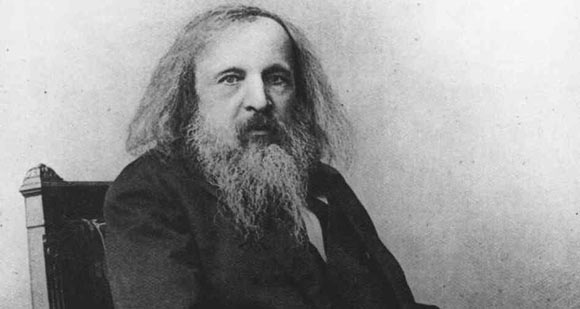Dmitri Mendeleev invented “Periodic Table”
Dmitri Mendeleev, known as the father of the Periodic Table, was a Russian scientist born in Tobolsk, Siberia on February 8th, 1834. He belonged to a well-off family and had 17 siblings. His father, a Russian Literature professor, died when he was young after which his mother moved to St. Petersburg, where Mendeleev received his education. In 1856, he graduated with a doctorate in chemistry from the University of St. Petersburg.
He started off his career as chemistry professor in the Technological Institute in 1863. He worked there for 27 years after which he resigned in 1890. Two years later he was chosen as the director Bureau of Weights and Masses. It was in the late 1860s when he started working on the periodic table which he is better known for. He published this rearrangement of the atomic masses in his paper “Principle of Chemistry” in 1869. This book proved to be a good time investor for him as it won many awards. He was also an advisor to the Russian Prime Minister, Sergei Witte. He, in his lifetime, wrote more than 70 papers on social and economical development.
Dmitri Mendeleev’s thesis, On the Combination of Water with Alcohol, invented the customary of Russian Vodka. He did some quintessential work for the upheaval of science but his greatest contribution would be of the periodic table. His work explained that when the elements are arranged by the atomic number their properties recur periodically. He identified new elements and their properties and even highlighted the elements whose atomic numbers were incorrect.
It was Mendeleev’s brain behind the investigation of the thermal expansion of liquids. He worked dynamically to perk up production techniques. He was the facilitator behind Russia’s first ever oil refinery. His papers also talked about the derivation of oil and how oil will become one of the most important economical components. He even initiated the idea of the transportation of oil via pipelines in 1863.
He received his first award for the work on the Periodic Law in 1882 and subsequently got his hands on the Davy medal of the Royal Society. Thirteen years later he received the Copley’s Medal. Mendeleev’s name was also shortlisted for the Nobel Prize three times in a row. His work while on one hand grabbed awards, on the other hand, was the subject matter to many controversies as well. His cynical attitude towards a number of theories including the ones on electrolytes and radioactivity was the mother of the controversies.
Russia lost this great scientist whose cram ranged from chemistry to Arctic exploration on the February 2nd, 1907. Many biographers say that the reason behind his death was Influenza. Dmitri Mendeleev was an influential man and his work and contributions towards the development in Russia are huge and archetypal.
